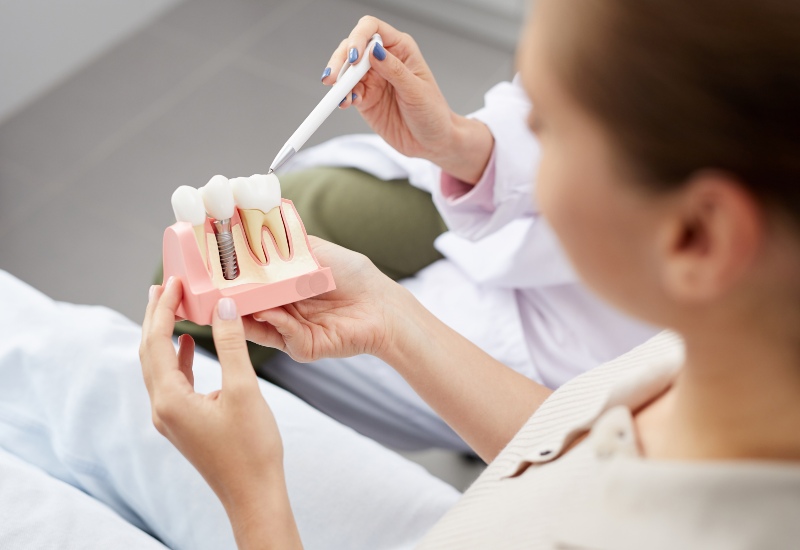Dental Implants: How Long Do They Really Last?
How Long Do Dental Implants Really Last?
If you have a missing tooth, you know the impact it can have on your daily life. It can affect your ability to chew, change the way you speak, and even make you feel self-conscious about your smile. While there are several options for tooth replacement, dental implants are widely regarded as one of the most effective and durable solutions. But what do we mean when we say “durable,” and how long do dental implants really last? Take a look at the longevity of dental implants and how you can maximize their lifespan with proper care.

Are Dental Implants Permanent?
In most cases, yes, dental implants are permanent. They’re designed to be a long-term solution to missing teeth, and the implant itself fuses to the existing jawbone. Because it becomes part of your jaw, an implant has the potential to last a lifetime with proper care. Many studies have shown high success rates for dental implants over the long term, as long as the patient keeps up with routine oral hygiene and dental checkups.
That said, we should distinguish between the implant and the crown that goes on top of it. The crown, or prosthetic tooth portion, is subject to the same wear and tear as natural teeth and will likely need to be replaced at some point. But don’t worry—you can usually count on your crowns to last up to 15 years!
Factors That Affect Dental Implant Longevity
While most dental implants will last a lifetime, their lifespan is still influenced by a variety of things. Here are some of the factors that affect implant longevity:
Oral Hygiene
Just like natural teeth, oral hygiene is key to making your dental implants last. Plaque and bacteria can still accumulate around the implant and cause infections and gum disease. Most dentists recommend that you continue with your normal hygiene routine: brushing twice a day, flossing daily, and rinsing with an antimicrobial mouthwash.
Lifestyle and Habits
Certain lifestyle choices or habits can negatively impact your dental implants over time. The following factors may harm the long-term results of dental implants:
- Smoking—Smoking restricts blood flow to the gums and can slow the healing process after surgery. Compared to non-smokers, those who smoke tend to have a higher risk of implant failure.
- Diet—A diet high in sugar and acidic foods can worsen gum disease and damage both your natural teeth and implant crowns.
- Teeth Grinding—Grinding or clenching your teeth puts excessive pressure on the implant and crown, which can lead to damage or loosening over time. If you have bruxism, a nightguard might be a good solution.

Overall Health
Your general health plays a crucial role in the success of dental implants. Conditions that affect the body’s ability to heal, such as uncontrolled diabetes or autoimmune diseases, can increase the risk of implant failure. With this in mind, make sure you discuss your entire medical history with your dentist and oral surgeon before electing to get dental implants. We may be able to suggest an alternative if implants don’t sound like a good choice for you.
Dental Implants vs. Other Tooth Replacement Options
Dental implants don’t work for everyone, and that’s okay. Fortunately, you have several other options to restore the look and function of your teeth. Explore these options with your dentist instead of dental implants:
- Dental Bridges—A dental bridge “bridges” the gap left by a missing tooth. It’s made up of a false tooth (a pontic) held in place by crowns attached to the adjacent natural teeth. Bridges typically last for years, but they do require the alteration of healthy teeth. This makes them more susceptible to decay in the future.
- Dentures—Dentures are removable solutions that can replace a full or partial set of teeth. While they are a more affordable option initially, they can be less comfortable, affect speech and eating, and require regular adjustments as the shape of your jaw changes over time. Nevertheless, many patients enjoy the convenience of non-invasive dentures.
How to Enjoy the Long-Term Results of Dental Implants
Once your dental implants are fully fused into the jawbone and your crowns are ready to go, it’s time to enjoy your new smile! However, don’t forget to do the proper maintenance along the way. If you want your dental implants to last as long as possible, be sure to implement these tips:
- Be Diligent About Oral Hygiene—Don’t skip a day! Always brush in the morning and evening and floss at least once, paying special attention to the area around the implant.
- See the Dentist Regularly—It can be easy to put off a dental checkup, but professional cleanings are essential. Your dentist will be able to monitor the health of your implant and catch issues early.
- Avoid Hard and Sticky Foods—Chewing on hard items like ice or hard candy can damage the crown, so be careful about what you eat on a daily basis.
- Wear a Nightguard—If you grind your teeth, wear a nightguard while you sleep to protect your teeth from excessive force.
Ready to Restore Your Smile?
Dental implants are a durable and aesthetically pleasing solution to missing and damaged teeth. While the posts should last a lifetime, proper care is always essential. The team at Livonia Dentistry is here to help you care for your implants and improve your long-term oral health. Contact us today to learn more.
